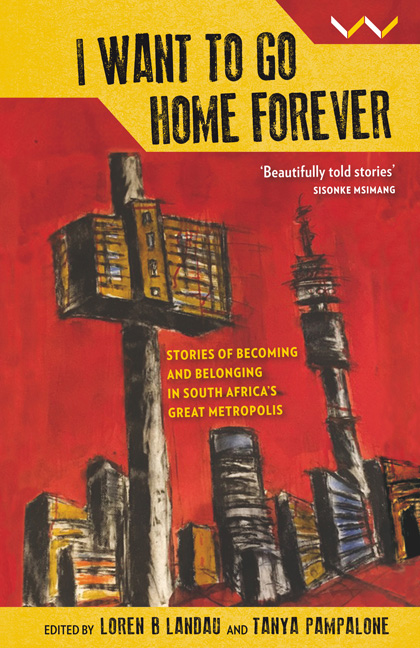Book contents
- Frontmatter
- Dedication
- Contents
- Foreword
- Preface
- Maps
- Introduction
- 1 A bed of his own blood: Nombuyiselo Ntlane
- 2 This country is my home: Azam Khan
- 3 On patrol in the dark city: Ntombi Theys
- 4 Johannesburg hustle: Lucas Machel
- 5 Don't. Expose. Yourself: Papi Thetele
- 6 The big man of Hosaena: Estifanos Worku Abeto
- 7 Do we owe them just because they helped us?
- 8 Love in the time of xenophobia: Chichi Ngozi
- 9 This land is our land: Lufuno Gogoro
- 10 Alien: Esther Khumalo*
- 11 One day is one day: Alphonse Nahimana*
- 12 I won't abandon Jeppe: Charalabos (Harry) Koulaxizis
- 13 The induna: Manyathela Mvelase
- Timeline
- Glossary
- Selected place names
- Contributors
12 - I won't abandon Jeppe: Charalabos (Harry) Koulaxizis
Published online by Cambridge University Press: 29 May 2019
- Frontmatter
- Dedication
- Contents
- Foreword
- Preface
- Maps
- Introduction
- 1 A bed of his own blood: Nombuyiselo Ntlane
- 2 This country is my home: Azam Khan
- 3 On patrol in the dark city: Ntombi Theys
- 4 Johannesburg hustle: Lucas Machel
- 5 Don't. Expose. Yourself: Papi Thetele
- 6 The big man of Hosaena: Estifanos Worku Abeto
- 7 Do we owe them just because they helped us?
- 8 Love in the time of xenophobia: Chichi Ngozi
- 9 This land is our land: Lufuno Gogoro
- 10 Alien: Esther Khumalo*
- 11 One day is one day: Alphonse Nahimana*
- 12 I won't abandon Jeppe: Charalabos (Harry) Koulaxizis
- 13 The induna: Manyathela Mvelase
- Timeline
- Glossary
- Selected place names
- Contributors
Summary
The son of Greek immigrants, Charalabos (Harry) Koulaxizis grew up around the family engineering business in Jeppestown, where he would go every day after school. In 1996, he and his father opened a catering equipment company with its warehouse headquarters in the same area, just across the road from the Wolhuter Hostel, a barrack-style, single-sex housing facility designed by the Johannesburg City Council in 1932 to house 3 500 migrant labourers, mostly Zulu men. Currently more than 6 000 men are estimated to live in the neglected and decrepit building, which has become a node of violence and illegal activities. In April 2015, Harry's catering warehouse was ‘hit’ during the spate of xenophobic attacks which had flared up throughout the country.
It was 14 April 2015. They were sitting in groups near the hostel, on all the roads, everywhere. They were toyi-toying in front of the hostel, burning tyres, stoning cars. They were holding pangas, knives, sticks, knobkerries, hammers. A lot of people, jumping up and down, dancing, shouting, screaming. Shirts were off. It was a whole commotion.
I had guards in the place before that – two security in the day and two security at night. But I went to the station commander that day and he said, ‘I advise you take these guys out. They can't sleep here. If they sleep, they're gonna kill them.’ I felt to myself: You know what? Just imagine these guards die for a few thousand or million rands’ worth of articles? I can always replace something but I cannot replace a human life. How would I explain to their families if they had died in my building, protecting my assets for some stupid little toyi-toying? So I decided to withdraw the guys.
Later on, when I went to go close the building, the people from the hostel – they stoned my car. I drove to my building, locked up and put the alarm on. In the middle of the night I came back and was checking what's going on and saw they were burning tyres. The next night they broke into other shops. Took some cars out and burnt them. They even burnt the one shop – went inside and put down petrol bombs and burnt it down.
- Type
- Chapter
- Information
- I Want to Go Home ForeverStories of Becoming and Belonging in South Africa's Great Metropolis, pp. 168 - 181Publisher: Wits University PressPrint publication year: 2018

